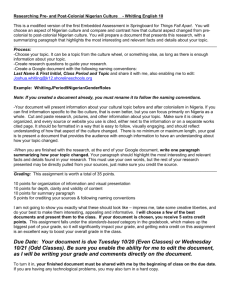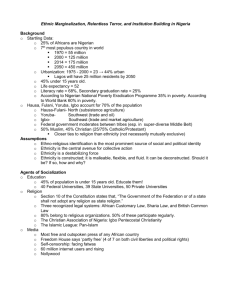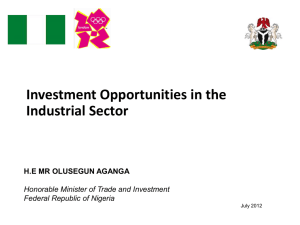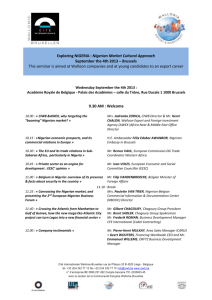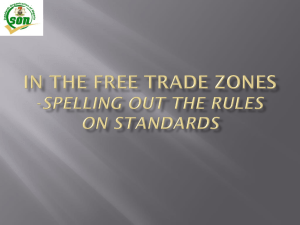cultural Analysis Of Spoken And written www Texts ( Nigerian English)
advertisement
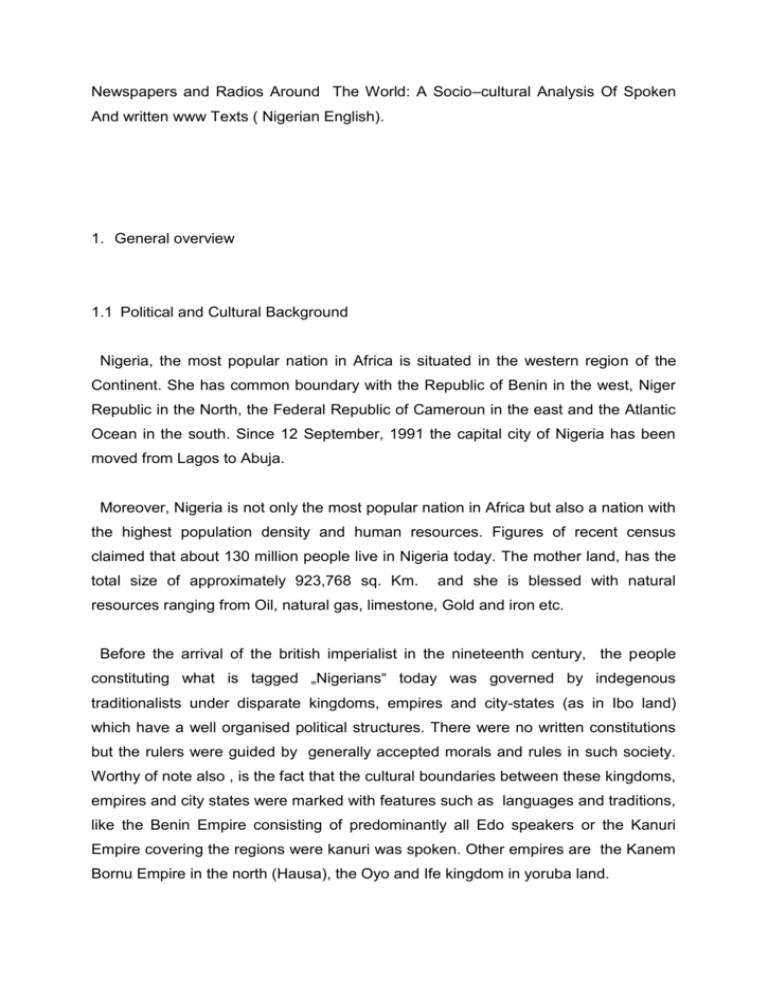
Newspapers and Radios Around The World: A Socio–cultural Analysis Of Spoken And written www Texts ( Nigerian English). 1. General overview 1.1 Political and Cultural Background Nigeria, the most popular nation in Africa is situated in the western region of the Continent. She has common boundary with the Republic of Benin in the west, Niger Republic in the North, the Federal Republic of Cameroun in the east and the Atlantic Ocean in the south. Since 12 September, 1991 the capital city of Nigeria has been moved from Lagos to Abuja. Moreover, Nigeria is not only the most popular nation in Africa but also a nation with the highest population density and human resources. Figures of recent census claimed that about 130 million people live in Nigeria today. The mother land, has the total size of approximately 923,768 sq. Km. and she is blessed with natural resources ranging from Oil, natural gas, limestone, Gold and iron etc. Before the arrival of the british imperialist in the nineteenth century, the people constituting what is tagged „Nigerians“ today was governed by indegenous traditionalists under disparate kingdoms, empires and city-states (as in Ibo land) which have a well organised political structures. There were no written constitutions but the rulers were guided by generally accepted morals and rules in such society. Worthy of note also , is the fact that the cultural boundaries between these kingdoms, empires and city states were marked with features such as languages and traditions, like the Benin Empire consisting of predominantly all Edo speakers or the Kanuri Empire covering the regions were kanuri was spoken. Other empires are the Kanem Bornu Empire in the north (Hausa), the Oyo and Ife kingdom in yoruba land. After the „colonial wars,“ the kingdoms of today´s Nigeria, like other part of Africa, was desolved and a central government was introduced through the 1914 Almagamation of south, East and northern Nigeria. With this, People of diverse historical, cultural, religous and language background were forcefully brought together to form the nation called Nigeria (meaning Niger Area) – derived from river Niger, the biggest river in the country. Unfotunately, Nigeria suffered several years of british colonial imperialism and exploitation which indeed left indelible marks on the nation today. At the long run, Nigeria got her independence on the first of october, 1960. But the problem of the so called „Artificial boundaries“ which resulted from the almagamation art resurfaced again after independence. The elites of the three regions could not co-relate with one another to develope a common nation interest. This among other things led to the Civil or Biafra War between 1967 to 1969. It was followed by a constantly reoccuring military governments and it is important to note that Out of the 42 years of indegenous self-government, about 27 years were scandalous military dictatorship. Today, Nigeria is a democratic nation (since 1999) with her 36 states and over 500 local governments. The presidential system of government with its strong federal character is the political system practiced by the present democratic government. Although one can still fill the trace of injustice, corruption, economic mismanagement, tribalism and human right violation, which were the major characteristics of the previous colonial and military administration, in this new government. As a result of the instable government and the total dependence on oil export, economic growth has been very slow (2,8% in 1997), inflation rate 12% in 1997, 28% unemployment rate in 1992 and GDP 132,7 billion in 1996. However, the new „democratic“ government through their various reform programmes seems to be moving towards a better Nigeria for her citizens. 1.2 Nigeria and her Languages As mentioned bevor, Nigeria is a multilingual society with totally different ethnic groups and language is one of the crucial instruments used to demarcate the common boundaries between one ethnic group from the other. Figures from various authors regarding the number of languages spoken in Nigeria showed that there is yet an accurate figure to be Known. The numbers commonly used by authors are between the range of 200 to 400 independent languages. However, the contact with Europeans, to be precise the Britons and Portuguese brought a new form of social interaction through languages. Pidgin English and what is today termed „Nigerian English“ was the result of this interaction. The British traders, missionaries and the imperialists could not speak the numerous languages of the various tribes in Nigeria and as such english was used as a medium of communication or lingua franca. After colonisation, English became the official or formal language in Nigeria. It is today, the language in schools, newspapers, radios and televisions, official business communications, government officials, a medium of communication between people of different ethnic groups etc. and to many it has even become a mother tongue. This not withstanding, there are three major Nigerian languages officially recognised and recommended to all Nigerian students by the federal ministry of education. These are Igbo, Hausa and Yoruba. Igbo is the language mostly spoken by the majority in the South-eastern part of Nigeria (17% of the Population) and Other minority languages in the east are Calabar, Tiv, Ika, Aniocha etc. In the southwestern region, Yoruba speakers are approximately 20% of the total population and other languages spoken especially in the middle belt are Ijaw, Isoko, Kwale, Bini, Issia etc. Also, in the north Hausa speakers (21%) dominates the total population and other languages spoken are Kanuri in the north-east, Fulani (Fulbe), the Nupe in the North-west etc. Having come to this point, we shall now return to Nigerian English which is the main topic of discussion. Let us beginn by considering the commonly asked question: Is there any thing like Nigerian English? If there is, What is it all about?. To this, Chinua Achebe (1965) quoted by Young (1971) defined Nigerian English as a language belonging to Nigeria but „still in communion with its ancestral home .... altered to suit its new african surrounding. We would be at liberty to set our own standards, create our own idioms, and so on with confidence and without any apology, he said. However, apart from the ambition of many Nigerian intellectuals to create a standard Nigerian English, the features identified by linguists in their independent researches proved that there is a standard Nigerian English different from other varieties of English yet to be completely analysed. These features will be discussed under phonetic, syntax and Lexical aspects of Nigerian English. 2. Analysis of features of Nigerian English 2.2 Lexical Features of Nigerian English Apart from the obvious differences in phonetic and syntatical structure of Nigerian English to other forms of English, most other features are also to be found in the innovations in lexical items, idioms and meaning. In this aspect we shall deal more with the deviation and creativity approaches than the interference approach which has more to do with phonetics. Lexical features of Nigerian English could occur in the following forms: I) New lexical coined from existing items or borrowed from the local languages or Pidgin. For instance the verb to Barb (meaning to shave or cut someone´s hair) is created from the noun Barber which has no verb in British or American English. Other examples are invittee derived from the Verb to invite, go slow is a common world use to mean trafic jam. There are also many examples of lexical items derived from the local languages which are inserted into Nigerian English as in Tokunbo. Let us consider this abstract taking from the Newswatch publication on the 10 th June, 2002 (Title: Bury the Coffins by Ogoh Alubo): „They argure that Nigeria is tokunbo country where age does not matter“. The world tokunbo is a yoruba world meaning second-hand products. Here the yoruba equivalence is inserted to replace the English world- second-hand. II) Some lexical items acquire new meaning: this aspect of lexical feature corresponds with the deviation approach whereby worlds like corner is used to mean a bend on a road., launcher is used to describe some one called to declare a fund-raising function or gathering open and to land means to finish or ends a discussion. III) Other lexical items retained older meanings no longer current in British or American varieties of English. For Example the world station still retains its old meaning – the locality in which one is working. IV) Certain idioms and phrases acquire new forms or meanings. The idiom „To have one´s cake and eat it“ is reframed to read – „To eat one´s cake and have it. V) Some totally new idioms are develop : -To take in means to become pregnant, to be with meaning to be in one`s possesion, -To be on seat means to be in the office, -Off-head means from memory, -To take the light is used in Nigerian context to mean making electric power go off or cut. The statement made by the president while he was encouraging the Nigerian national team on 7th of June., 2002 contains such new idioms: Show them pepper, Obasanjo tells Eagles on phone (Vanguard Newspaper, 2022). To show an opponent pepper means to defeat or overfpower him.


